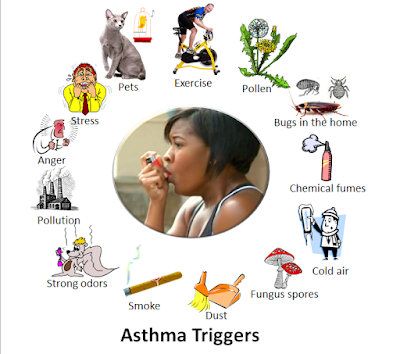What Is Asthma? What Are Asthma Symptoms, Causes, Treatments And Prevention
Asthma is a respiratory condition which is characterized by attacks of spasm (contraction) in bronchi of lungs with increased productivity of sticky secretions which causes extreme difficulty in breathing. Due to inflammation of lungs’ tube and sticky secretions, they get obstructed, hence creating difficulty in breathing.
 |
| Comparison of Normal Airway VS Asthmatic Airway Vs Asthmatic Airway During Attack |
Asthma Symptoms
People suffering from asthma may experience following symptoms:
- Shortness of breathing (difficulty in breathing)
- Audible wheeze (whistling sound that produces due to inflammation or mucus buildup in bronchial tubes)
- Coughing
- Chest tightness and pain
Everyone suffering from asthma doesn’t have exactly the same symptoms as above at the same time. You may have different symptoms at different times. Your asthma symptoms may also vary from one asthma attack to the next, being mild during one and severe during another.
Mild asthma attacks are more common. The airways remain open a few minutes to few hours. Severs attacks are less common but last longer and require immediate medical help.
Following are some of the early symptoms of asthma:
- Frequent coughing
- Shortness of breath
- Tiredness
- Coughing or wheezing
- Moody, grouchy
- Decrease in lung function
- Signs of cold
- Trouble sleeping
Caution: Any asthma symptom is serious and can become deadly if left untreated.
Causes of Asthma
Well, there is no actual know cause of asthma. The causes of asthma vary from one person to another. When you get asthma attack, you get spasms of muscles around your airways, inflammation of bronchial tubes and filling with mucus.
Asthma frequently runs in families and is closely associated with hayfever and eczema. It is essentially caused by an allergic type of reaction of the immune system. Sometimes the irritants which set off the reaction are not strictly allergens but chemical irritants, for example smoke and fumes.
Some substances usually trigger asthma are:
- Allergy can cause asthma as cells present in lungs react to various irritants like house dust, pet fur, pollens. Chemical irritants can also trigger asthma as cigarette smoke, factory pollutants, aerosol sprays, household cleansers and car exhausts. So, allergy can cause asthma.
- Certain medication including aspirin, ibuprofen, naproxen, beta blockers
- Preservatives added to some kind of foods including shrimp, dried fruit, and processed potatoes
- Respiratory infections
- Gastroesophageal reflux disease (condition in which stomach acid backs into throat)
In families having strong history asthma, the genes which cause asthma are probably there from birth but the condition is triggered by outside factors like house dust, smoke, severe infection and exposure to irritant chemicals etc.
Asthma Treatment
Word treatment refers to prevention and long-term control of disease. In Asthma treatment, your physician first recognizes your triggers; track your breathing, then take steps to curb it. In outbreak of asthma, you may use a quick relief inhaler albuterol.
 |
| This is How You Can Manage Your Asthma |
Steroids and Other Anti-Inflammatory Drugs
Inhaled steroids are anti-inflammatory, lifesaving drugs for asthma patients who prevent asthma attacks and reduce swelling and mucus production in bronchial tubes resulting in less sensitiveness of airways to asthma triggers. These anti-inflammatory drugs include fluticasone (Flovent HFA), budesonide (Pulmicort Flexhaler), flunisolide (Aerobid), ciclesonide (Alvesco), beclomethasone (Qvar) and mometasone (Asmanex).
Asthma Inhalers
Asthma inhalers are used to deliver asthma drugs directly to the lungs. Some inhalers deliver one drug while some deliver two medications. Fluticasone-salmeterol (Advair Diskus), budesonide-formoterol (Symbicort) and mometasone-formoterol (Dulera) — contain a long-acting beta agonist along with a corticosteroid.
Long-Acting Beta Agonists
These are inhalers which include salmeterol (Serevent) and formoterol (Foradil, Perforomist). They open up airways but some researches have shown that they may increase the risk of severe asthma attack so take them only in combination with inhaled corticosteroid.
Short-Acting Beta Agonists
These quick-relief bronchodilators (inhalers) act within minutes to ease symptoms during an asthma attack. They include albuterol (ProAir HFA, Ventolin HFA, others), levalbuterol (Xopenex) and pirbuterol (Maxair). Short-acting beta agonists can be taken using a portable, hand-held inhaler or a nebulizer — a machine that converts asthma medications to a fine mist — so that they can be inhaled through a face mask or a mouthpiece.
Consult Your Asthma Specialist
Asthma is a common disease but it is a serious condition that demands a proper medical diagnosis and targeted asthma treatment. If you’ve been diagnosed with asthma but your treatment doesn’t work, then you need to consult your doctor very soon. You may need to change your asthma medication for better control. Talk to your doctor for asthma support and find the asthma drugs that work best for you.
Asthma Prevention
Yes, it is possible to prevent asthma if you avoid asthma triggers. If complete avoidance of trigger factors is impossible for you then you can take following measures:
- If you smoke, then stop it immediately
- Avoid house dust, smoke, irritants
- Avoid chemical irritants, car exhaust


Comments 0
EmoticonEmoticon